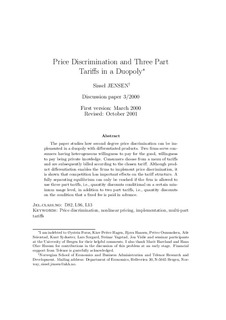Price discrimination and three part tariffs in a duopoly
Working paper
Permanent lenke
http://hdl.handle.net/11250/162958Utgivelsesdato
2000-03Metadata
Vis full innførselSamlinger
- Discussion papers (SAM) [657]
Sammendrag
The paper studies how second degree price discrimination can be implemented
in a duopoly with differentiated products. Two firms serve consumers
having heterogeneous willingness to pay for the good, willingness
to pay being private knowledge. Consumers choose from a menu of tariffs
and are subsequently billed according to the chosen tariff. Although product
differentiation enables the firms to implement price discrimination, it
is shown that competition has important effects on the tariff structure. A
fully separating equilibrium can only be reached if the firm is allowed to
use three part tariffs, i.e., quantity discounts conditional on a certain minimum
usage level, in addition to two part tariffs, i.e., quantity discounts on the condition that a fixed fee is paid in advance.
Beskrivelse
Revised October 2001
Utgiver
Norwegian School of Economics and Business Administration. Department of EconomicsSerie
Discussion paper2000:3
